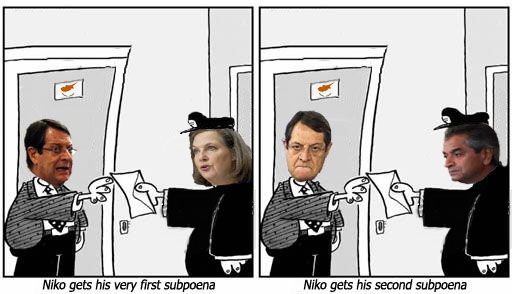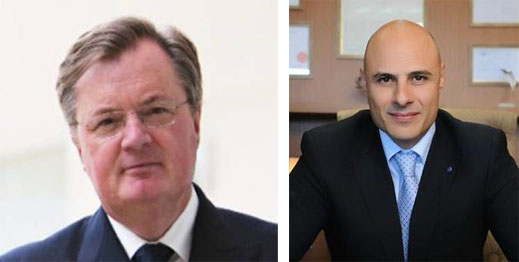By John Helmer, Moscow
At the end of this month the Irish High Court in Dublin will consider an application for the arrest of Cyprus President Nikos Anastasiades’s (lead image, left) law partner, Theofanis Philippou, and for an order to disclose company documents produced by them both on behalf of their client, the fugitive Russian businessman and former senator, Leonid Lebedev. An order for attachment and committal, as it is called in Ireland, directed against powerful figures in a neighbouring European Union (EU) country, is almost unprecedented, Dublin court sources say.
If the Dublin court agrees, Cyprus officials say they expect an Irish arrest order will be passed to the Irish police, and from them to the Cyprus Ministry of Justice. From there it will go to Cyprus Attorney-General Costas Clerides (2nd image, right). “We are interested to see,” officials say. “We will be waiting for this request.”
Lebedev initiated a claim for $2 billion in New York state’s Supreme Court in 2014. He is charging Victor Vekselberg and Len Blavatnik, shareholders in the Russian oil company first called TNK (Tyumen Oil Company), with withholding payment for their purchase of his shareholding, plus dividends as TNK merged with British Petroleum (TNK-BP), then sold out to the state oil company, Rosneft.
Vekselberg and Blavatnik say they paid Lebedev $600 million more than a decade ago and owe him nothing now.

The merger of TNK with BP in February 2003 – Blavatnik at right, Vekselberg, centre, and Lord John Browne of BP, left.
Through the Philip Lee law firm in Dublin, they have asked for the assistance of the Irish High Court to obtain witness testimony and evidence of documents and accounts. On May 30, Justice Mary Faherty ordered Philippou and several others to appear in person “by no later than 29 July 2016”. They were also ordered to produce accounts and other documents relating to Lebedev by a deadline of June 30.
New York and Dublin court files confirm Philippou has been ordered to produce his and the Anastasiades firm’s records of all dealings, communications and agreements they have had with Lebedev, Coral Petroleum and a connected Cyprus operation called Agragorn. Philippou has also been asked to confirm “the identity of Coral’s ultimate beneficial owners between 1998 and 2013.”
If Philippou or Anastasiades say they know Lebedev was the “ultimate beneficial owner”, the $2 billion question has been answered, and the case is over.
All but one of Lebedev’s claims were dismissed by the New York court on December 2, last year; for details, read this. The remaining issue to be decided in New York is what Coral Petroleum did with the $600 million, and the role the Cypriots played, along with an Irish accountant named Peter Roberts, in moving the money away from taxation in Ireland, into Cyprus, and then elsewhere. New York Supreme Court Judge Saliann Scarpulla also dismissed Lebedev’s attempt to stop a parallel proceeding by Vekselberg and Blavatnik at the London Court of International Arbitration.
Their lawyers in Dublin won’t respond to questions about the case. Irish court sources say Roberts (below, left) has been asking for more time to comply with the subpoena; he refuses to respond to telephone-calls at his office in Cork. The Irish newspapers, The Independent and Sunday Business Post, have been following the case closely, Dublin sources believe, because the Revenue, the Irish tax authority, is considering whether Coral Petroleum should pay dozens of millions of dollars in Irish capital gains tax on Lebedev’s share sale.
Philippou (right) was at his Limassol office on Tuesday, and was asked through an assistant whether he intends to comply with the Dublin order. He did not respond.
The Cyprus media have been investigating other allegations of corruption and abuse of power by Anastasiades before and after he took office as president in February 2013. He denies any wrongdoing, and none has been charged. Philippou, too, has been investigated by Attorney-General Clerides for involvement in a scheme to sell the state-owned Cyprus Airways to Ryanair of Ireland. Clerides concluded there was insufficient evidence to charge wrongdoing. For more details, read this.
The evidence of Lebedev’s dealings in Cyprus reportedly involve Anastasiades and Philippou in assisting him to acquire Cyprus citizenship in 2011, and then conceal it from the Cyprus courts, as well as from the Federation Council in Moscow, where Lebedev was a senator representing Chuvashia. Lebedev left the senate and Russia for the US in April 2014. He said at the time he was resigning voluntarily “to avoid becoming a target for all sorts of discussions and misinterpretations that harm the reputation of the Federation Council.”
Through a Cyprus trust managed by Philippou, Lebedev operates bank accounts in New York with an estimated $100 million in cash. According to Tver regional court sources and a Moscow newspaper, Russian prosecutors have been investigating how much of this money may have been taken from the regional electric utility TGK-2, moved to Cyprus-registered companies and their bank accounts, and then deposited in the New York banks. For Lebedev and his money to remain safer in the US than they are in Russia or Cyprus requires a deal with the US authorities, Russian officials suspect. Safe haven and immunity from prosecution for Lebedev in the US depend on the State and Justice Departments, Washington sources believe.
Victoria Nuland (lead image, left) is the State Department official in charge of US policymaking for Russia, Ukraine, as well as Cyprus, Europe, the Caucasus and Balkan states.

Source: http://www.state.gov/p/eur/ci/
In June Nuland was asked what she knows of the relationship between Lebedev and Anastasiades. She refuses to say. The State Department is not denying that Lebedev has obtained permission to live in the US. His home is reported to be in Los Angeles. Lebedev’s dealings with Anastasiades and Philippou are the subject of questions published in the Cyprus media, and circulating in the Cyprus parliament, for Anastasiades to answer. They are termed the “Nuland blackmail”.
Anastasiades and Nuland met in Cyprus yesterday (July 12). They last met, also in Cyprus, on April 19. On June 6, Nicos Christodoulides, the president’s aide, met Nuland in Washington. For details, read this. The talks are reported by the State Department “to convey continued U.S. support for a fair and lasting settlement of the Cyprus problem through the process facilitated by the UN Secretary General’s Good Offices Mission.”
In fact, Cypriot sources report Nuland has been pressing Anastasiades to accept Turkish troops, who have been occupying the northern part of Cyprus since they invaded in 1974, to remain there permanently under a NATO flag.
Turkish officials in Ankara and the Turkish-Cypriot leader Mustafa Akinci, whom Nuland also met yesterday, insist there can be no settlement of the territorial conflict without a Turkish security guarantee. They mean Turkish troops on the island, but don’t say so. Nuland refuses to confirm that she and the Obama Administration are working towards the extension of NATO to include Cyprus, as UN sources are reported as telling the Greek press. Anastasiades supports NATO membership for Cyprus; most Cypriot voters do not.
Marios Evriviades, a retired presidential advisor in Nicosia and Cyprus diplomat in Washington, reports this week there is Cyprus and Greek government concern at Nuland’s attempts to enlarge NATO’s military role in the eastern Mediterranean. This is aimed, Evriviades warns, at covering Israel’s occupation of Palestinian territory, Turkish occupation of Cyprus, and “closing all anti-western fronts.” .
The Greek government has also told Anastasiades it categorically opposes any form of security guarantee for Cyprus by an external power, and that Turkish forces must be withdrawn from the island. According to a high-ranking source familiar with a recent demarche from the Greek foreign ministry, “you can say that at the very least the Greek position is making Anastasiades feel uncomfortable”.
Greek President Prokopis Pavlopoulos (below, right) paid a brief call to Anastasiades (left) in Cyprus on Monday, warning him again, hours before Nuland landed.
On Tuesday Nuland tried in public to sound conciliatory. “Our only role here is to listen to both sides”, Nuland said, referring also to the Turkish side.

Anastasiades with Nuland (foreground) at the presidential office in Nicosia yesterday. Cyprus Foreign Minister Ioannis Kasoulides and Christodoulides are at centre, on the Cypriot side of the table.
Anastasiades said before the meeting that if there is to be pressure in the talks, the US should apply it to the Turks. After yesterday’s meeting with Nuland, Anastasiades would say no more in his twitter feed than: “Briefed #US Assistant Secretary of State Ms Victoria #Nuland on #Cyprus problem negotiations”. Nuland’s version for the press was there had been “a really, really good meeting, very hard working”.
After questioning from the Cyprus media about the Nuland blackmail, Christodoulides’s twitter feed has stopped mentioning Nuland. Regarding the plan to allow Turkish troops to remain in Cyprus under a NATO flag, Christodoulides has told Cypriot reporters: “[it] does not correspond to reality or to what was discussed between the President of the Republic and Mrs Nuland.” After the Nuland meeting, Christodoulides said on Cyprus radio that the president had “reiterate[d] the position of our side of not accepting guarantees and Turkish troops.”
Today Anastasiades will fly to Mongolia where he will attend the annual summit session of the Asia-Europe Meeting (ASEM) group. He and President Vladimir Putin will meet privately on the sidelines. In the past the US has publicly warned Anastasiades against “business as usual” with Russia, sanctions busting, and direct dealings with Putin. Last week, the newly elected Cyprus parliament (pictured below) voted to drop the sanctions against Russia.
All parties voted in favour except for Anastasiades’s party, Democratic Rally (DISY). Revealing how much damage the allegations of corruption and collaboration have done to Anastasiades’s re-election chances, the DISY leader, Averof Neophytou (above, right), quoted Putin in support of Cyprus’s independence, and led his deputies in abstaining from a vote in favour of sanctions. In an unusually sharp rebuke to Washington and Brussels, the Cypriot deputies declared it “unacceptable” for sanctions to attack Russian officials and elected deputies of the State Duma in Moscow, “our longstanding friends of Cyprus and firm supporters of the fight to lift the Turkish injustice against the people of our country.”
Cyprus sources say they believe Philippou has appealed to Anastasiades to protect him from the Irish subpoena to testify in the Lebedev case. Cyprus and Russian officials are anticipating that Putin will discuss the Nuland blackmail when he and Anastasiades meet later this week.















Leave a Reply